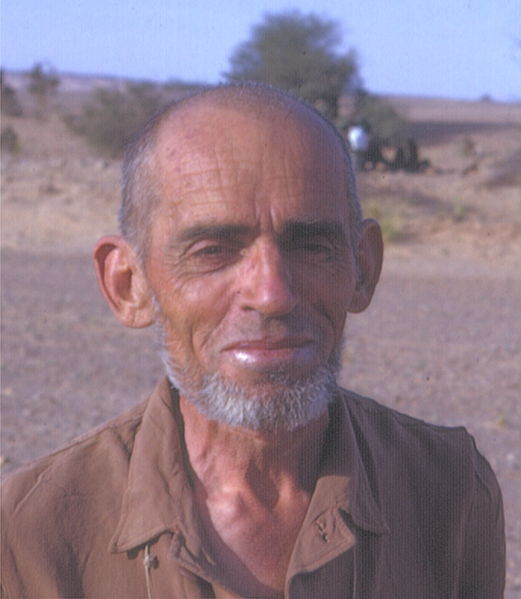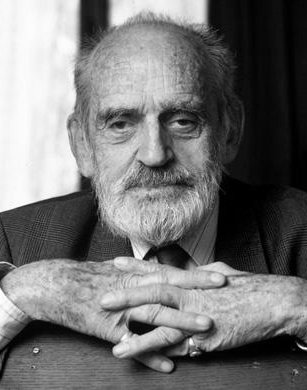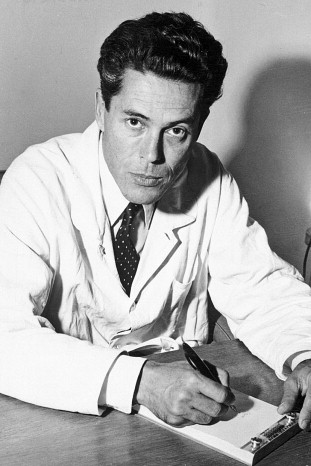<Back to Index>
- Naturalist and Explorer Théodore André Monod, 1902
- Biologist Jacques Lucien Monod, 1910
PAGE SPONSOR


Théodore André Monod (Rouen, April 9, 1902 - Versailles, November 22, 2000) was a French naturalist, explorer, and humanist scholar.
Early in his career, Monod was made professor at the Muséum national d'Histoire naturelle and founded the Institut Français d’Afrique Noire in Senegal. He became a member of the Académie des sciences d'outre - mer in 1949, member of the Académie de Marine in 1957, and member of the Académie des Sciences in 1963. In 1960 he was one of the founders of the World Academy of Art and Science.
He began his career in Africa with the study of monk
seals on Mauritania's Cap Blanc peninsula. However, he
soon turned his attention to the Sahara desert, which he
would survey for more than sixty years in search of
meteorites. Though he failed to find the meteorite he
sought, he discovered numerous plant species as well as
several important Neolithic sites. Perhaps his most
important find (together with Wladimir Besnard) was the
Asselar man, a 6,000 year old skeleton of the Adrar des
Ifoghas that many scholars believe to be the first remains
of a distinctly black
person.
Monod, the son of Wilfred Monod, attended the Lycée Pierre Corneille in Rouen. His father was a pastor of the Temple Protestant de l'Oratoire du Louvre which Theodore also attended. He subsequently became the founding president of the Francophone Unitarian Association (1986 - 1990), the first openly Unitarian religious organization established in France, and later sponsored a spin off of the AUF known as the Fraternal Assembly of Christian Unitarians.
Monod was also politically active, taking part in pacifist and antinuclear protests until only some months before his death. He wrote several articles and books that adumbrated the emerging environmentalist movement. He described himself as a Christian anarchist.
Monod was the great - grandson of Frédéric Monod. He
shared a common ancestor with biologist Jacques Monod, the
musician Jacques - Louis Monod, the politician Jérôme Monod and director Jean - Luc
Godard.


Jacques Lucien Monod (9 February 1910 - 31 May 1976) was a French biologist who was awarded a Nobel Prize in Physiology or Medicine in 1965, sharing it with François Jacob and Andre Lwoff "for their discoveries concerning genetic control of enzyme and virus synthesis". He and François Jacob showed that the living cell controls its manufacture of proteins through a feedback mechanism analogous to a thermostat. Born in Paris, he was also awarded several other honors and distinctions, among them the Légion d'honneur. Monod (along with François Jacob) is famous for his work on the Lac operon. Study of the control of expression of genes in the Lac operon provided the first example of a transcriptional regulation system. He also suggested the existence of mRNA molecules that link the information encoded in DNA and proteins. Monod is widely regarded as one of the founders of molecular biology.
Monod was born in Paris to an American mother from Milwaukee, Charlotte (Sharlie) MacGregor Todd, and a French Huguenot father, Lucien Monod who was a painter and inspired him artistically and intellectually. He attended the lycée at Cannes until he was 18. In October 1928 he started his studies in biology at the Sorbonne.
In his studies he discovered that the course work was decades behind the current biological science. He learned from other students a little older than himself, rather than from the faculty. "To George Teissier he owes a preference for quantitative descriptions; André Lwoff initiated him into the potentials of microbiology; to Boris Ephrussi he owes the discovery of physiological genetics, and to Louis Rapkine the concept that only chemical and molecular descriptions could provide a complete interpretation of the function of living organisms."
Monod also made important contributions to the field of enzymology with his proposed theory of allostery in 1965 with Jeffries Wyman (1901 - 1995) and Jean - Pierre Changeux. His doctoral work explored the growth of bacteria on mixtures of sugars and documented the sequential utilization of two or more sugars. He coined the term diauxie to denote the frequent observations of two distinct growth phases of bacteria grown on two sugars. He theorized on the growth of bacterial cultures and promoted the chemostat theory as a powerful continuous culture system to investigate bacterial physiology (1949, Ann. Rev. Microbiol., 3:371 - 394; 1950, Ann. Inst. Pasteur., 79:390 - 410).
The experimental system ultimately used by Jacob and Monod was a common bacterium, E. coli, but the basic regulatory concept (described in the Lac operon article) that was discovered by Jacob and Monod is fundamental to cellular regulation for all organisms. The key idea is that E. coli does not bother to waste energy making such enzymes if there is no need to metabolize lactose, such as when other sugars like glucose are available. The type of regulation is called negative gene regulation, as the operon is inactivated by a protein complex that is removed in the presence of lactose (regulatory induction).
He was also a proponent of the view that life on earth arose by freak chemical accident and was unlikely to be duplicated even in the vast universe. "Man at last knows he is alone in the unfeeling immensity of the universe, out of which he has emerged only by chance. His destiny is nowhere spelled out, nor is his duty. The kingdom above or the darkness below; it is for him to choose", he wrote in 1971. He used the bleak assessment that forms the earlier part of the quote as a springboard to argue for atheism and the absurdity and pointlessness of existence. Monod stated we are merely chemical extras in a majestic but impersonal cosmic drama — an irrelevant, unintended sideshow. His views were in direct opposition to the religious certainties of his ancestor Henri's well known brothers Frédéric Monod and Adolphe Monod. In 1973 he was one of the signers of the Humanist Manifesto II.
Monod was not only a biologist but also a fine musician and esteemed writer on the philosophy of science. He was a political activist and chief of staff of operations for the Forces Françaises de l'Interieur during World War II. In preparation for the Allied landings, he arranged parachute drops of weapons, railroad bombings, and mail interceptions.
Jacques Monod died of leukemia in 1976 and was buried in
the Cimetière du Grand Jas in Cannes on the French
Riviera.
- "The first scientific postulate is the objectivity of nature: nature does not have any intention or goal."
- "Anything found to be true of E. coli must also be true of elephants."
- "The universe is not pregnant with life nor the biosphere with man... Man at last knows that he is alone in the unfeeling immensity of the universe, out of which he emerged only by chance. His destiny is nowhere spelled out, nor is his duty. The kingdom above or the darkness below; it is for him to choose."